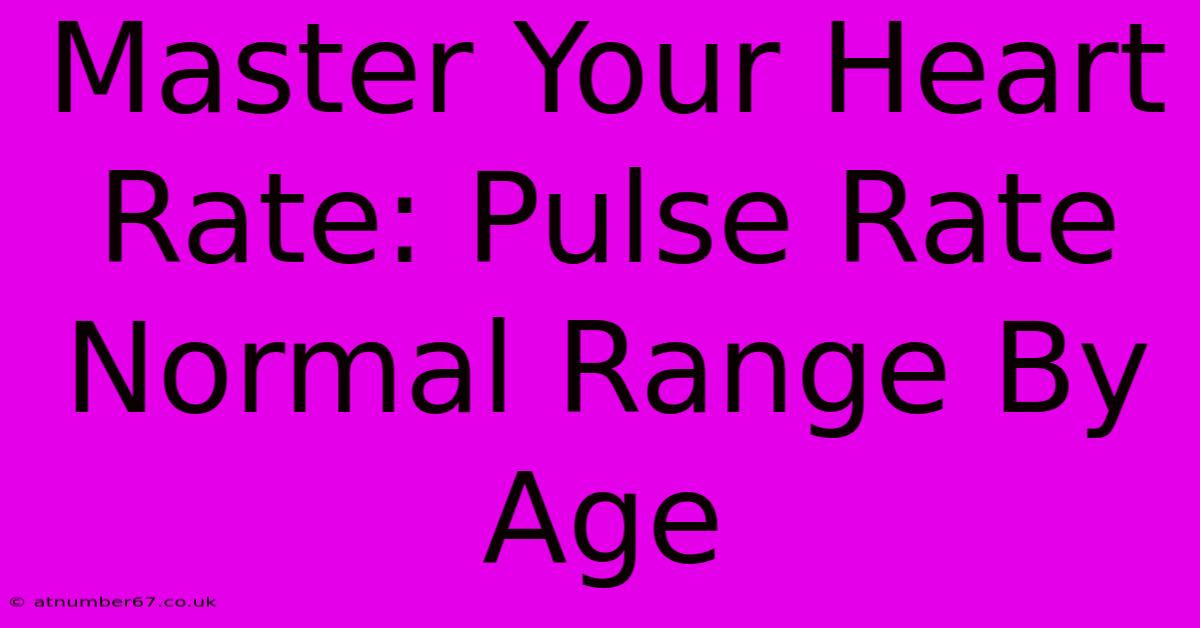Master Your Heart Rate: Pulse Rate Normal Range By Age

Table of Contents
- Master Your Heart Rate: Pulse Rate Normal Range By Age
- Understanding Your Heart Rate (Pulse)
- Normal Pulse Rate Range By Age
- Infants (0-1 year): 70-190 bpm
- Children (1-10 years): 70-110 bpm
- Children (10-17 years): 60-100 bpm
- Adults (18-60 years): 60-100 bpm
- Adults (60+ years): 60-100 bpm (possibly higher in some cases)
- Factors Affecting Heart Rate
- When to Consult a Doctor
- Maintaining a Healthy Heart Rate
Master Your Heart Rate: Pulse Rate Normal Range By Age
Understanding your heart rate, or pulse, is crucial for maintaining good health. Knowing your normal range can help you monitor your fitness levels, identify potential health issues, and make informed decisions about your exercise routine. This comprehensive guide will delve into the normal pulse rate range by age, factors influencing heart rate, and what to do if your heart rate falls outside the healthy range.
Understanding Your Heart Rate (Pulse)
Your heart rate is the number of times your heart beats per minute (BPM). You can easily check your pulse by placing your index and middle fingers on your wrist (radial artery) or neck (carotid artery). Count the number of beats in 60 seconds. A simple, accurate way to check is to count the beats for 30 seconds and multiply by 2.
Normal Pulse Rate Range By Age
The normal resting heart rate varies depending on age, fitness level, and overall health. Here's a general guideline:
Infants (0-1 year): 70-190 bpm
This wide range reflects the rapid growth and development during infancy.
Children (1-10 years): 70-110 bpm
As children age, their heart rate generally slows down.
Children (10-17 years): 60-100 bpm
Heart rate continues to stabilize during adolescence.
Adults (18-60 years): 60-100 bpm
This is the commonly cited range for healthy adults. Well-trained athletes may have resting heart rates significantly lower than 60 bpm.
Adults (60+ years): 60-100 bpm (possibly higher in some cases)
While the range remains similar, some older adults may experience a slightly elevated heart rate due to various health conditions. It's crucial to consult a doctor if you notice significant changes.
Important Note: These ranges are guidelines. Individual variations are normal. Your personal normal heart rate may be slightly higher or lower than the average. Consistent monitoring is key to understanding your own body.
Factors Affecting Heart Rate
Several factors can influence your heart rate:
- Physical activity: Exercise increases your heart rate. The intensity of the exercise directly correlates with the increase.
- Medications: Certain medications, such as beta-blockers, can lower your heart rate. Stimulants, on the other hand, may increase it.
- Stress and anxiety: Emotional stress can significantly raise your heart rate.
- Dehydration: Lack of fluids can lead to a faster heart rate.
- Body temperature: Fever or exposure to extreme heat can increase your heart rate.
- Underlying health conditions: Various medical conditions, such as heart disease, thyroid problems, and anemia, can affect your heart rate.
- Fitness level: Athletes often have lower resting heart rates due to increased cardiovascular fitness.
When to Consult a Doctor
While knowing your normal heart rate is important for self-monitoring, it's crucial to seek medical attention if you experience:
- A consistently high heart rate (tachycardia): Persistently elevated heart rates, even at rest, can indicate underlying health problems.
- A consistently low heart rate (bradycardia): An unusually slow heart rate can also be a sign of an issue.
- Irregular heartbeat (arrhythmia): Noticeable irregularities in your heart rhythm should always be checked by a doctor.
- Dizziness or fainting: These symptoms may be related to abnormal heart rates.
- Chest pain or discomfort: This is a serious symptom requiring immediate medical attention.
Maintaining a Healthy Heart Rate
Maintaining a healthy heart rate involves a holistic approach:
- Regular exercise: Engage in regular physical activity to strengthen your cardiovascular system.
- Balanced diet: Consume a healthy diet rich in fruits, vegetables, and whole grains.
- Stress management: Practice stress-reducing techniques such as yoga, meditation, or deep breathing exercises.
- Adequate sleep: Aim for 7-8 hours of quality sleep per night.
- Hydration: Drink plenty of water throughout the day.
- Regular check-ups: Schedule regular visits with your doctor for routine checkups and monitoring.
By understanding your normal pulse rate and the factors that influence it, you can take proactive steps to maintain your cardiovascular health. Remember, consistent monitoring and seeking medical advice when needed are crucial for ensuring a healthy heart.

Thank you for visiting our website wich cover about Master Your Heart Rate: Pulse Rate Normal Range By Age. We hope the information provided has been useful to you. Feel free to contact us if you have any questions or need further assistance. See you next time and dont miss to bookmark.
Featured Posts
-
Rohit Sharma The Undisputed King At His Age
Mar 31, 2025
-
The Disdained Son In Law Finds His Power
Mar 31, 2025
-
How Pewdiepies Net Worth Changed Over The Years
Mar 31, 2025
-
Kalogeras Sisters Age And The Legacy They Leave Behind
Mar 31, 2025
-
Theo Baker Age A Deep Dive
Mar 31, 2025
